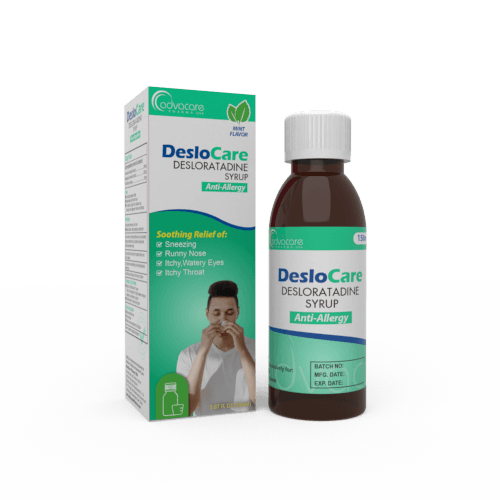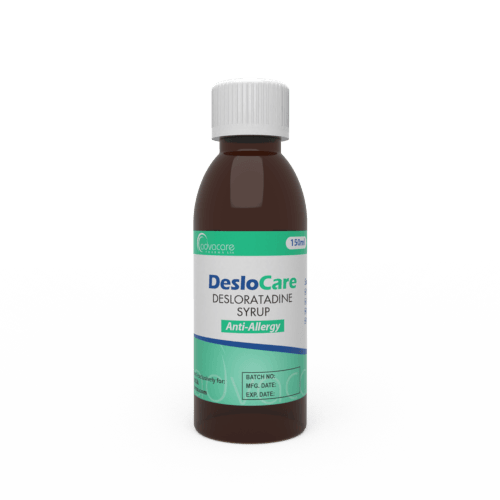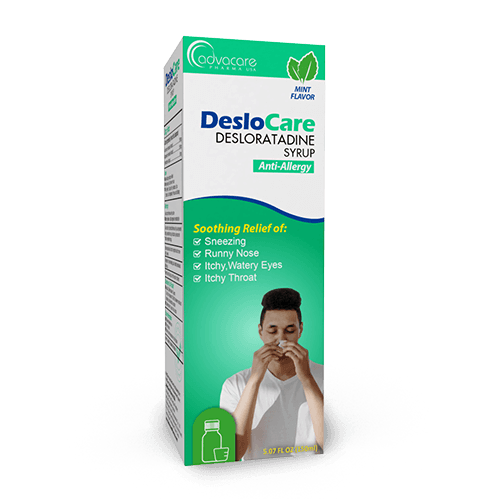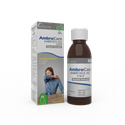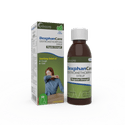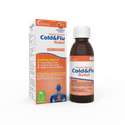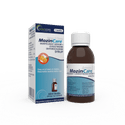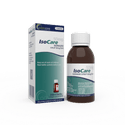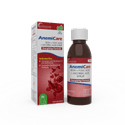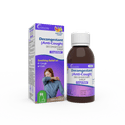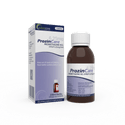- Home›
- Pharmaceuticals›
- Syrups›
- Desloratadine Syrup
Desloratadine Syrup
Dosage
Packaging
What is Desloratadine?
Active Ingredients: Desloratadine
Desloratadine Syrup is an antihistamine drug used to relieve symptoms associated with allergies. It helps reduce sneezing, watery eyes, itching, and runny nose. Desloratadine is also used to help treat hives for individuals with chronic skin issues. This medicine is suitable for adults and children over 6 months old.
Desloratadine Syrup is a non-sedating, long-acting antihistamine that is well tolerated by patients. It typically begins to work within 1 hour of administration. The syrup formulation is recommended over other oral treatments, such as tablets, for children ages 6 months to 11 years old.
Desloratadine is classified as a second-generation antihistamine. It is an H1-receptor antagonist that works by blocking the actions of histamine, the chemical responsible for many symptoms of allergies.
Desloratadine is an active metabolite of loratadine. Loratadine is another commonly used antihistamine drug with similar activity, which is available as Loratadine Oral Solution.
Desloratadine Syrup is produced with a dosage of 2.5mg/5ml. This medication is packaged in a 150ml bottle.
AdvaCare Pharma is a trusted global supplier of Desloratadine Syrup. Our company is known for its high-quality yet cost-effective medications that are available for distribution. This product is manufactured in a GMP-certified facility.
Why choose us as your Desloratadine Syrup manufacturer?
AdvaCare Pharma is a reputable manufacturer of Desloratadine Syrup, and other pharmaceutical syrups, with a presence in 65 countries. We have implemented a "vested supplier-distributor relationship" business model that differentiates us from other large-scale medical manufacturers, facilitating a closer partnership with our pharmaceutical distributors. With a range of more than 500 GMP-approved medicines, including 55+ treatments in oral liquid dosage form, we are a Desloratadine Syrup manufacturer that doctors trust and patients rely on.
Uses
What is Desloratadine Syrup used for?
It is used to treat nasal and non-nasal symptoms caused by seasonal and perennial allergic rhinitis, including hay fever. It can help relieve itchy eyes, runny nose, and hives. It is also used to relieve itching associated with chronic idiopathic urticaria, as it can help reduce in the size and number of hives.
How is Desloratadine Syrup used?
This medication is manufactured as a liquid to be taken orally. Desloratadine Syrup can be taken with or without food.
It is recommended to shake the bottle before use. The liquid medicine should be carefully measured to ensure dosage accuracy. Do not use a regular table spoon to measure the dose.
How should Desloratadine Syrup be stored?
Desloratadine Syrup should be stored in a dark, dry location at room temperature (15-30°C). Do not freeze this medicine or expose to excessively high temperatures. Keep the syrup in its original bottle and store the bottle upright when not in use. Keep the bottle out of the reach of children and pets. Any expired medication should be discarded.
What dose should be taken?
Adult Dosing For allergic rhinitis and urticaria, the usual dose is 5mg taken once per day. For pruritus and hives due to chronic idiopathic urticaria, the usual dose is 5mg taken once per day.
Renal Dosing The recommended dose should start with 5mg taken every other day.
Hepatic Dosing The recommended dose should start with 5mg taken every other day.
Pediatric Dosing For perennial allergic rhinitis, the usual dose is as follows:
- For > 12 years: 5mg, taken once per day.
- For 6-11 years: 2.5mg, taken once per day.
- For 12 months-5 years: 1.25mg, taken once per day.
- For 6-12 months old: 1mg, taken once per day.
For seasonal allergic rhinitis, the usual dose is as follows:
- For > 12 years: 5mg, taken once per day.
- For 6-11 years: 2.5mg, taken once per day.
- For 2-5 years: 1.25mg, taken once per day.
For chronic idiopathic urticaria, the usual dose is as follows:
- For > 12 years: 5mg, taken once per day.
- For 6-11 years: 2.5mg, taken once per day.
- For 12 months-5 years: 1.25mg, taken once per day.
- For 6-12 months old: 1mg, taken once per day.
Renal Dosing for pediatrics Dose adjustment guidelines for children have not been defined. It is recommended to consider the adult renal dosing guidelines.
Hepatic Dosing for pediatrics Dose adjustment guidelines for children under 12 years old have not been defined. It is recommended to consider the adult hepatic dosing guidelines. For adolescents and children over 12 years old, the usual starting dose should be given every 48 hours.
Refer to a doctor or pharmacist for guidelines on dosage. Dosage recommendations may vary between regions and individual products. Always consult the packaging insert before taking this medication.
What happens if a dose is missed?
If following a schedule, the forgotten dose should be taken as soon as possible. If it is nearly time for the next dose, the missed dose should be skipped. Do not take two doses at the same time. Do not take more doses than prescribed.
What are the symptoms of an overdose of Desloratadine Syrup?
The most common symptom of overdose is drowsiness. In the case of a possible overdose, it is advised to call a local poison control hotline for more information. If the individual has had a seizure, collapsed or isn't breathing, emergency services should be called.
Who can use Desloratadine?
Desloratadine Syrup can be given to adults and children, but caution is advised for specific groups of patients.
Pregnant This medication may be used during pregnancy only if the benefits outweigh the risks. Though desloratadine is not expected to cause fetal harm, there have not been adequate human studies to assess the risk of birth defects and miscarriage.
Breastfeeding This medication is considered acceptable for short-term use, but the benefits must be weighed against the risks. Desloratadine is known to pass into milk. Limited human data suggests no known risk of infant harm; however, there are not adequate human data available to properly assess the risk. Based on decreased prolactin levels associated with desloratadine, there is a theoretical risk of reduced milk production.
Children Desloratadine is considered safe and well-tolerated in pediatric patients over 6 months old. It is recommended to take special care to ensure dosing accuracy for children under 1 year. This medicine is not advised for children under 6 months.
Geriatric Desloratadine has not been shown to cause significantly different issues in the elderly population. It should be noted that elderly patients should take extra care to avoid standing and sitting quickly, as this medication may cause dizziness. It is also important to note that some older adults may metabolize this drug more slowly.
Are there any additional monitoring parameters advised for Desloratadine Syrup?
It is advised to obtain renal function test and LFT at baseline. As with any medication, it is important to monitor for any signs of hypersensitivity reactions.
Other warnings
For patients with hepatic or renal impairment, caution should be expressed. It may be necessary to follow the renal/hepatic dosing recommendations.
Slow metabolizers may experience an increased incidence of adverse effects.
Side Effects
As with all pharmaceuticals, some unwanted effects can occur from the use of Desloratadine Syrup.
Common side effects include, but may not be limited to:
- dry mouth
- sore throat
- muscle pain
- headache
- upset stomach
- drowsiness or tiredness
- menstrual pain
- diarrhea (in children under 2 year old)
- fever (in children under 2 year old)
- cough (in children under 2 year old)
Consult a doctor if the following side effects occur:
- signs of an allergic reaction (e.g. rash, itching, hives)
- irritability
- shortness of breath
- arrhythmia
- seizures (in children)
For a comprehensive understanding of all potential side effects, consult a medical professional.
If any symptoms persist or worsen, or you notice any other symptoms, please call your doctor.
Precautions
Do NOT use Desloratadine Syrup if:
- You are allergic to Desloratadine or any of the other ingredients.
- You have had a hypersensitivity reaction to similar compounds such as loratadine.
Before treatment, consult your doctor regarding any medications you are taking to address potential drug interactions, some known interactions occur with cold or allergy medications, sedatives, ketoconazole, certain antibiotics (e.g. erythromycin, azithromycin), fluoxetine, and cimetidine. This is not a complete list.
This medication may not be suitable for people with certain conditions. It is important to consult with a doctor if you have any health conditions, including:
- liver disease
- kidney disease
- pregnancy or breastfeeding
- history of seizures
Do not give this medication to children under 4 years old without the guidance of a doctor.
This medicine may cause drowsiness or dizziness. Driving and the use of machinery should be avoided until it is clear how the medication affects you. It is recommended to avoid standing or sitting too quickly, as this may cause an increase in dizziness or a faint spell, particularly in elderly patients.
It is advised to avoid alcohol during treatment, as alcohol may interfere with the effects of desloratadine.
Avoid grapefruit products while taking desloratadine, as grapefruit may increase the amount of this medicine in the body.
Desloratadine may interfere with the results of allergy skin tests. This medication is known to reduce wheal and flare reactions.
This medication is typically taken on an as needed basis and should not be taken for longer than indicated. It is advised to consult a medical professional for use longer than 14 days.
Desloratadine 2.5mg: Why the most common dose?
Desloratadine 2.5mg is consistently chosen for its efficacy in treating allergic rhinitis with minimal drowsiness. This dose provides adequate symptom relief for many patients while reducing the risk of side effects, making it a preferred option for ongoing allergy management.
References
Desloratadine Therapy Improves Allergic Rhinitis Symptoms in Latin American Children Aged 6 to 12 Years
This study focused on determining the effectiveness of desloratadine syrup in relieving symptoms of allergic rhinitis (AR) among children in Latin America.
This is an open-label trial conducted in 5 Latin American countries, and included 455 children aged 6 to 12 years with seasonal or perennial AR who were treated with desloratadine syrup 2.5mg/d for 6 weeks. Thirty percent of subjects were also taking corticosteroids during the treatment with desloratadine, and 21.3% had a history of asthma.
The Total Symptom Severity 4 questionnaire and decrease in severity of individual nasal symptoms of congestion, rhinorrhea, pruritus, and sneezing were measured during the study by physicians and subjects' caregivers.
Results showed that desloratadine can lead to a decrease in mean Total Symptom Severity 4 score, from 7.54 at baseline to 1.96 at study end (P < 0.0001), and in individual symptom scores, including congestion (P < 0.0001 for all). Allergic rhinitis symptoms were also rated better by 94% of caregivers. There were side effects in only 6% of treated patients.
The study concludes that monotherapy with desloratadine, in conjunction with corticosteroids, is efficacious and safe in treating AR.

You might be interested in...
Why AdvaCare Pharma?
As an industry leader, we are aware of our responsibility to provide affordable and sustainable solutions to improve healthcare worldwide.
